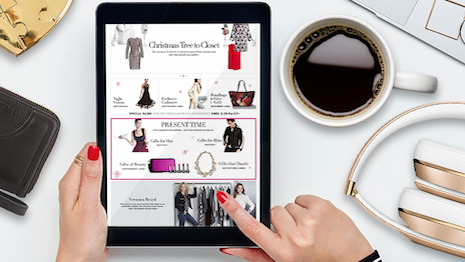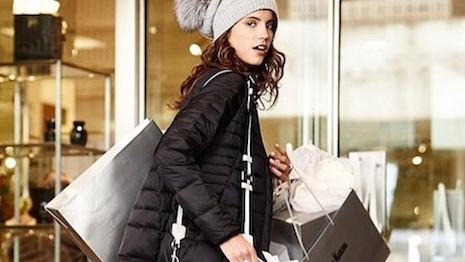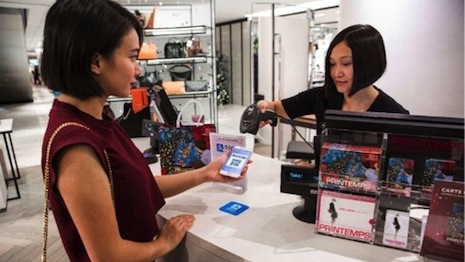 Neiman Marcus is looking to omnichannel to boost sales. Image credit: Neiman Marcus
Neiman Marcus is looking to omnichannel to boost sales. Image credit: Neiman Marcus
Over the past few years, omnichannel has become a buzzword in luxury and retail marketing, but by 2020, consumers will no longer tolerate brands' mistakes. A new report from Fashionbi reveals that time is running out for brands and retailers to create a seamless omnichannel experience. Retailers need to take on strategies similar to Neiman Marcus, who has developed an application that bridges the gap between offline and online almost seamlessly.
“It's hard to find a brand which completely ignores the digital and social media marketing trend, however, in the majority of cases, the brands are still very far from the omnichannel retail with the quite basic tactics, e.g. simply place a social media icon on a store window,” said Yana Bushmeleva, chief operating officer at Fashionbi, Milan.
Omnichannel is now Fashionbi’s "Omnichannel Marketing" report stresses that retailers can no longer silo their businesses and all channels must operate as a single entity. Neiman Marcus serves as an example due to its app’s functionality that connects guests with store associates via messaging, FaceTime, email and phone calls. The app also notifies users of promotions, the ability to check loyalty points, styling tips and look inspiration. Neiman Marcus gives each sales associate a mobile app full of customer data. Image credit: Neiman Marcus.
The app’s artificial intelligence solution makes product recommendations and suggestions based on preferences and past behavior.
Fashionbi notes that the demand for a seamless multichannel customer journey will become more serious as consumers will expect nearly perfect execution.
Customers no longer shop through a traditional path, a strategy retailers have come to rely on. Retailers need to completely retool the notion of this previously established linear customer journey.
Alipay is just one of many solutions that brands such as Macy’s, Saks Fifth Avenue and Neiman Marcus are using to create these seamless experiences.
Neiman Marcus gives each sales associate a mobile app full of customer data. Image credit: Neiman Marcus.
The app’s artificial intelligence solution makes product recommendations and suggestions based on preferences and past behavior.
Fashionbi notes that the demand for a seamless multichannel customer journey will become more serious as consumers will expect nearly perfect execution.
Customers no longer shop through a traditional path, a strategy retailers have come to rely on. Retailers need to completely retool the notion of this previously established linear customer journey.
Alipay is just one of many solutions that brands such as Macy’s, Saks Fifth Avenue and Neiman Marcus are using to create these seamless experiences.
 Printemps partners with Wirecard and became the first department store in France to accept payments via Alipay. Image credit: Paul Blind, Wirecard.
The mobile payment solution, powered by Chinese ecommerce giant Alibaba, allows users to easily checkout on different digital platforms and in store, as well as allows travelers to seamlessly purchase across borders.
Italian makeup brand Kiko is using social media to weave together its brand story through multiple channels. Its stores feature windows that direct fans to its social pages and its Web sites effectively link out to these pages as well, where beauty enthusiasts can interact with content from influencers.
Fashion brand Gap uses a similar strategy and posts prominently boast its exact usernames in stores and online. The retailer, however, has a unique account for each local market to better cater to the local consumer.
Additional insight
According to another report from NewStore, Burberry is leading the pack as far as luxury brands and retailers offering omnichannel shopping experiences.
The report found that an alarming number of brands are missing basic omnichannel tools such as a shared shopping cart between online and in-store trips and personalized follow-up messages. Of the ones that did offer these kinds of tools, Burberry stood out as a brand that has created a next-level shopping experience that uses every channel (see more).
Many brands are experimenting in the omnichannel area to help prepare themselves for the curve that is coming.
For instance, French department store chain Galeries Lafayette inaugurated a new experience-led store concept at the Carré Sénart shopping center in the Paris region.
Galeries Lafayette’s concept is the first of its 56 French stores to incorporate fully omnichannel selling tactics and is firmly anchored in the local environment. The latest Galeries Lafayette location is considered the first significant addition to its French store network in the past few years (see more).
Printemps partners with Wirecard and became the first department store in France to accept payments via Alipay. Image credit: Paul Blind, Wirecard.
The mobile payment solution, powered by Chinese ecommerce giant Alibaba, allows users to easily checkout on different digital platforms and in store, as well as allows travelers to seamlessly purchase across borders.
Italian makeup brand Kiko is using social media to weave together its brand story through multiple channels. Its stores feature windows that direct fans to its social pages and its Web sites effectively link out to these pages as well, where beauty enthusiasts can interact with content from influencers.
Fashion brand Gap uses a similar strategy and posts prominently boast its exact usernames in stores and online. The retailer, however, has a unique account for each local market to better cater to the local consumer.
Additional insight
According to another report from NewStore, Burberry is leading the pack as far as luxury brands and retailers offering omnichannel shopping experiences.
The report found that an alarming number of brands are missing basic omnichannel tools such as a shared shopping cart between online and in-store trips and personalized follow-up messages. Of the ones that did offer these kinds of tools, Burberry stood out as a brand that has created a next-level shopping experience that uses every channel (see more).
Many brands are experimenting in the omnichannel area to help prepare themselves for the curve that is coming.
For instance, French department store chain Galeries Lafayette inaugurated a new experience-led store concept at the Carré Sénart shopping center in the Paris region.
Galeries Lafayette’s concept is the first of its 56 French stores to incorporate fully omnichannel selling tactics and is firmly anchored in the local environment. The latest Galeries Lafayette location is considered the first significant addition to its French store network in the past few years (see more).
“Probably the most surprising finding is about the investment of the fashion companies in mobile payment,” Fashionbi’s Bushmelva said. “Inditex is working on its own mobile payment system called InWallet and Asos works with Apple Pay.
“Plus some offline Western retailers started to accept the payment via WeChat (e.g. Harrods),” she said.
